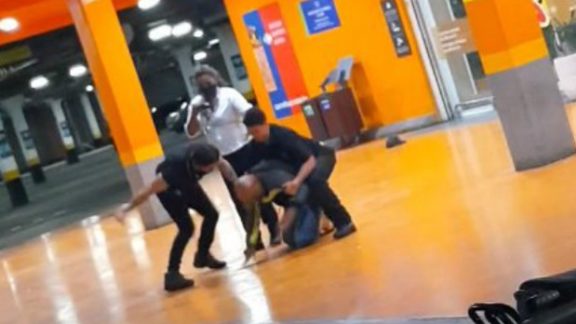RIO DE JANEIRO, BRAZIL – The death of a black client from a beating by two white security guards in a supermarket on Thursday night, November 19th, the eve of Black Awareness Day, was a strong reminder of daily racism in Brazil, also reflected in coronavirus deaths.
Videos on social networks show how one of the attackers punches João Alberto Silveira Freitas, 40, in the face, while the other is holding him by the neck in a Carrefour facility in Porto Alegre, Rio Grande do Sul. Both have been arrested.

Commenting on the case, which sparked protests and unrest on Friday, Vice-president General Hamilton Mourão described it as “regrettable,” but denied that Brazil is a racist country, although the victim is black and the perpetrators are white. “I say to you with complete peace of mind: there is no racism. I say this to you because I lived in the United States. Racism is there. (…) Here there is inequality,” he said.
The police are still investigating the details of what happened, but according to a detective quoted by the local press, the two men were employed by Carrefour and at some point pushed the victim down with their knees when he was already on the ground. The first evidence gathered by investigators points out that everything began with an argument between the client, who was shopping with his wife, and a cashier, who called security. João Beto, as the victim was known, was taken to the parking lot and died there, after being beaten.
A rescue team was called, but failed to resuscitate him and he died on site. The two guards, one of them a moonlighting state police officer, were arrested in the act. Carrefour immediately condemned the attack and announced the termination of its contract with the outsourced company that employed the security guards.
November 20th, a holiday in several Brazilian cities, is the date when the country reflects, with data and testimonies, on the legacy of slavery, abolished 132 years ago. The date recalls the death of Zumbi dos Palmares, who led a slave uprising. This year, the celebration of the date, although affected by the coronavirus, gained momentum after the major antiracist protests in the United States and the progress – albeit slight – of the election of black mayors and city councilors in the first round of municipal elections last Sunday.
People close to the victim called a protest on Friday outside the closed supermarket. Rio Grande do Sul Governor Eduardo Leite and the two candidates for the Porto Alegre City Hall – Manuela D’Ávila and Sebastião Melo – rushed to denounce the attack.
This brutal event led the Rio Grande do Sul government to anticipate the inauguration of the State Police Station to Fight Intolerance (DPCI). The announcement was made by the governor himself, and by the head of the Civil Police, Nadine Anflor, on Friday, November 20th.
The new police station will be inaugurated on December 10th, when International Human Rights Day is celebrated.
Detective Nadine Anflor confirmed that the detainees have been charged with triple counts of murder by suffocation and for the victim’s inability to resist. According to Eduardo Leite, the case will be thoroughly investigated. “All state efforts are focused in the investigation and for those responsible for this crime to stand before Justice, having the opportunity of the defense. The footage proves beyond doubt that there were excesses that must be investigated and the resulting punishment for the crime must be applied,” she reiterated.
Regarding the involvement of an offduty state police officer in the death of João Alberto, the commander of the State Police Brigade, Colonel Rodrigo Mohr Picon, said that he should be dismissed. “He should be dismissed from the force and be held accountable for the crime as a civilian,” said the officer.
The brutal death of Freitas made the headlines in that context. It is a very different emphasis compared to the lack of repercussion after similar cases and the thousands of deaths that occur every year in police operations, mainly targeting young black people from slums.

On Friday, death threats against Ana Lúcia Martins, the first black city councilor elected in Joinville, Santa Catarina – the whitest state in Brazil, populated in the 20th century by German and Italian immigrants – also made national headlines. One of the threats stated: “Now all we have to do is kill her and the white substitute comes in.”
Paradoxically, this same state elected in 1934 the first black state deputy, teacher Antonieta de Barros. Since then, her peers have made little progress, as a senator’s tweet this week illustrates: “The profile of the Brazilian voter is mostly women, black, with elementary schooling and 37 years of age. The profile of the elected is: male, white, with higher education and 49 years of age.”
In these municipal elections, which in large cities will have a second round on November 29th, Brazilians elected more black city councilors than ever before, but the increase is small, despite the existence of quotas: from 42 to 45 percent. Their representation is still far from their real weight, because they represent over half the population. In Brazil, the term black also typically includes mixed-race individuals. As it is up to each person to decide how he or she declares himself or herself, in these elections thousands of candidates have changed their self-declared race. Parties often cheat the quotas with fraudulent candidacies.
Statistics have systematically shown that black Brazilians die younger, live in worse conditions, fall ill more often, and earn less than their white or Japanese-Brazilian compatriots. Moreover, they are over-represented among the unemployed and violence victims.
Calls for a boycott on Carrefour are increasing, as it has already been involved in an incident different from this one, but which also caused outrage. Last year, a salesman of a brand offering products in the aisles of one of its supermarkets suffered a heart attack, died on the spot, and those responsible for the store covered the body with several umbrellas and surrounded it with beer boxes, remaining open for business until closing time.
Source: El País, Estadão Conteúdo

